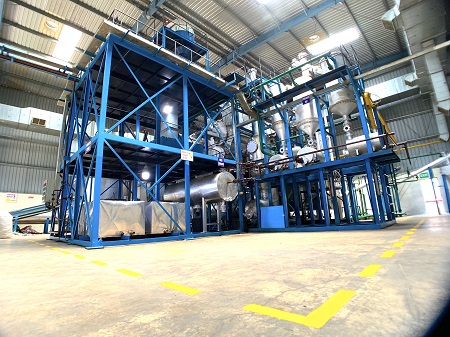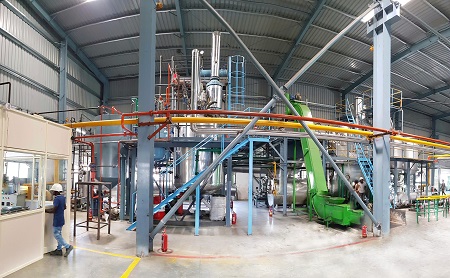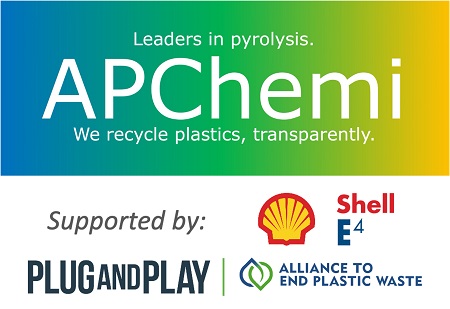The quest for viable recycling has brought forth several innovative technologies in the limelight. One of these is chemical recycling which has been considered as an option for efficient recycling of plastic waste. As the global plastics industry strengthens its commitment to reduce plastic waste, it is projected that recycled plastic and plastic waste to oil market will rise substantially. In this area, Agile Process Chemicals LLP (APChemi) has introduced the plastic pyrolysis technology as a solution to the plastic waste problem. International Plastics News for Asia had the chance to talk to Mr. Suhas Dixit, Founder and CEO of APChemi, on the company's pyrolysis technology and how it can accelerate the move towards efficient plastic recycling.

Mr. Suhas Dixit, CEO, Agile Process Chemicals LLP
What is plastic pyrolysis technology and how does it bring about reduction in plastic waste?
Mr. Dixit: APChemi is a leader in plastic pyrolysis technology. Plastic pyrolysis technology converts plastic into oil using hot air. Our technology prevents landfilling of 80,000 kgs/day of plastic waste by converting this end-of-life plastic waste into valuable oil. Our motto is to recycle plastics transparently.
At the great environmental cost, more than 300 million tonnes of plastic waste is dumped or burned yearly. Around 150 million tonnes of plastic waste reaches landfills, rivers, and oceans annually. Less than 9% of this plastic waste generated today is mechanically recyclable, which means that chemical recycling is the only other option for recycling 91% of plastic waste generated today.
To solve the plastic pollution problem, aggressive environmental legislations like plastic tax and extended producer responsibility are being adopted globally. Brand owners or FMCG companies are under increasing regularity pressure, environmental legislation pressure to meet ever increasing recycling targets or plastic waste management targets.
Plastic is manufactured through crude oil, hence, it could be converted back into oil. Chemical recycling of mixed plastic waste by pyrolysis is the only scalable and sustainable solution. “Pyro'' means heat and “lysis” means breakdown.
Plastic pyrolysis is a fairly complicated process, and APChemi has mastered this process over the last 12 years. In simple terms, in the process of plastic waste pyrolysis, plastic waste is subjected to temperatures of 600 degrees Celsius in the absence of oxygen to convert waste into high value oil. Oil can be used as third generation biofuels or it can be used for the production of circular economy plastics as we will see it ahead.
Crude oil is used by the industry to produce plastics and surfactants, as well as fuels. Consumers dispose of 150 million tonnes of plastic waste annually to rivers, oceans, and land. APChemi offers commercially proven technology and the plants to convert this mechanically non-recyclable plastic waste into the required quality of pyrolysis oils which can be used to reduce dependency on crude oil. APChemi offers proven technology and plants to make this transformation happen.

Chemical recycling of mixed plastic waste by pyrolysis
is the only scalable and sustainable solution.
What are APChemi's accomplishments in this area?
Mr. Dixit: Since the last 12 years, APChemi has been innovating and pushing the commercialisation of pyrolysis. We are leaders in pyrolysis with over 30 pyrolysis plants commissioned so far. We have published 7 patents in pyrolysis including a breakthrough technology for pyrolysis of polyethylene terephthalate (PET) containing multilayer packaging.
APChemi is supported by Shell Petrol chemicals as well as the Alliance to End Plastic Waste acceleration programmes for technology and business development. We sponsored research at Institute of Chemical Technology and with Greenjoules, we produce Euro-6 quality biofuels. Our clients include Equate Petro Chemicals, UFLEX, and Shell.
We started in 2007 and as of 2020, we have commissioned over 30 pyrolysis projects across Africa, India, and Europe. The year 2020 has been an important milestone for APChemi due to some remarkable technology breakthroughs we have achieved. We have large reactor capacity plants as well as some technologies to minimise or prevent failing of pyrolysis reactors. APChemi has proudly developed 50 tonnes per day single reactor pyrolysis technology. This new 50TPD single reactor technology reduces the capital investment as well as operational expenditure of plastic pyrolysis by 30% to 50%.
APChemi has a solid team of 45, with a plan to expand to a hundred colleagues by the end of 2021. Our drive would be business development as well as R&D initiatives. We take an industry proven project approach.

APChemi has been innovating and pushing the commercialisation of pyrolysis.
How does APChemi support customers willing to undertake pyrolysis as part of their recycling operations?
Mr. Dixit: If a potential customer is interested in deploying our technology, we start with technical and financial assessment of the project by conducting pilot plant trials of raw materials. Pilot plant trials help our clients estimate the quality and quantity of end-products producible from raw material using APChemi's technology. The pilot trials also provide the necessary design basis for proceeding the front end engineering package. APChemi offers additional solutions namely, technology transfer, detailed engineering, plant construction, and we also offer ongoing support for our clients after commissioning. Our project approach can be modified to meet customer’s priority milestones. Communication of risks, issues, change management and project key performance indicators are agreed with the clients at the project kick-off meeting.
Looking at some of our achievements, APChemi has successfully installed a multilayer plastic waste packaging pyrolysis plant for a leading packaging manufacturer. We have been operating and maintaining this plant for the past two years. The plant processes printed multilayer packaging waste, which also has a 50% of PET (polyethylene terephthalate) as well as an aluminium layer. So we have a sorted pyrolysis technology pyrolysis for multilayer packaging waste.
APChemi also has supplied technology and plants to convert post-consumer plastic waste or landfill plastic waste into synthetic diesel equivalent oil. For example, our project in Kenya converts 10,000 kgs of municipal solid waste segregated plastic waste into 7,000 litres,, of diesel equivalent pyrolysis oil, on a daily basis.
Apart from plastic pyrolysis, we have also expanded into biomass pyrolysis.APChemi has supplied plants to convert biomass into EURO-6 quality petrol and diesel. Our biomass pyrolysis projects are rapidly expanding to meet ever increasing biofuel demand. Our ongoing as well as upcoming projects include several 10 tonnes per day to 50 tonnes per day plastic waste as well as biomass pyrolysis projects globally.

What developments in the plastics industry have a major impact on how pyrolysis technology is accepted today?
Mr. Dixit: Today, more than 95% of plastic waste ends up in landfills, or in sanitation plants. Globally, extended producer responsibility strategy (EPR) is the only viable legislation to prevent landfilling of plastic waste. Legislations around the world increasingly targets recycled content and packaging, while also preventing land filling and promoting recycling of plastic waste to produce post-consumer recycled plastics.
Another legislation which has shifted or transformed the industry around recycling is the implementation of China's policy banning the import of non-recyclable plastic waste. This has resulted in the piling up of plastic waste in Europe and America, which are major exporters of plastic waste into Asia. The most recent and impactful legislation is the 800 Euro per metric tonne plastic tax imposed on countries in the European Union. The plastic tax is calculated on the basis of non-recyclable plastic packaging waste at an expected rate of 0.80 Euro per kilogramme. The new plastic tax took effect on January 1, 2021. Now, as history goes, when a legislation starts in Europe, the same legislation gets transposed across America, Canada, and the rest of the world, or during the period of 5-10 years. This will really boost the recycling industry. Ending plastic waste to landfill would be extremely expensive compared to recycling this plastic waste. These legislations around recycling are really transforming the industry today.
The latest European legislation which asks for 50% recycled content in packaging by 2030 is also another development. Based on that, McKinsey & Company has estimated that achieving 50% reuse and recycling rate in 2030 would demand 57 million tonnes of plastic waste to be converted into oil on a yearly basis. So the ‘plastic-to-oil’ industry is going to grow rapidly in the coming years. Pyrolysis is expected to be a big industry. Mckinsey and Company has estimated that by 2030, pyrolysis is expected to contribute US$25.4 billion to the recycling industry profit pool. You have to be in it to win it, and The APChemi team is there!
Agile Process Chemicals LLP
Address: 315, “B”- Wing, 3rd Floor, “Shree Nand Dham Plot No. 59, Sector 11, CBD Belapur, Navi Mumbai, Maharashtra 400614
Tel: +91-22 2759 9010 / +91 9930205577
E-mail address: bd@apchemi.com
Website: www.apchemi.com














